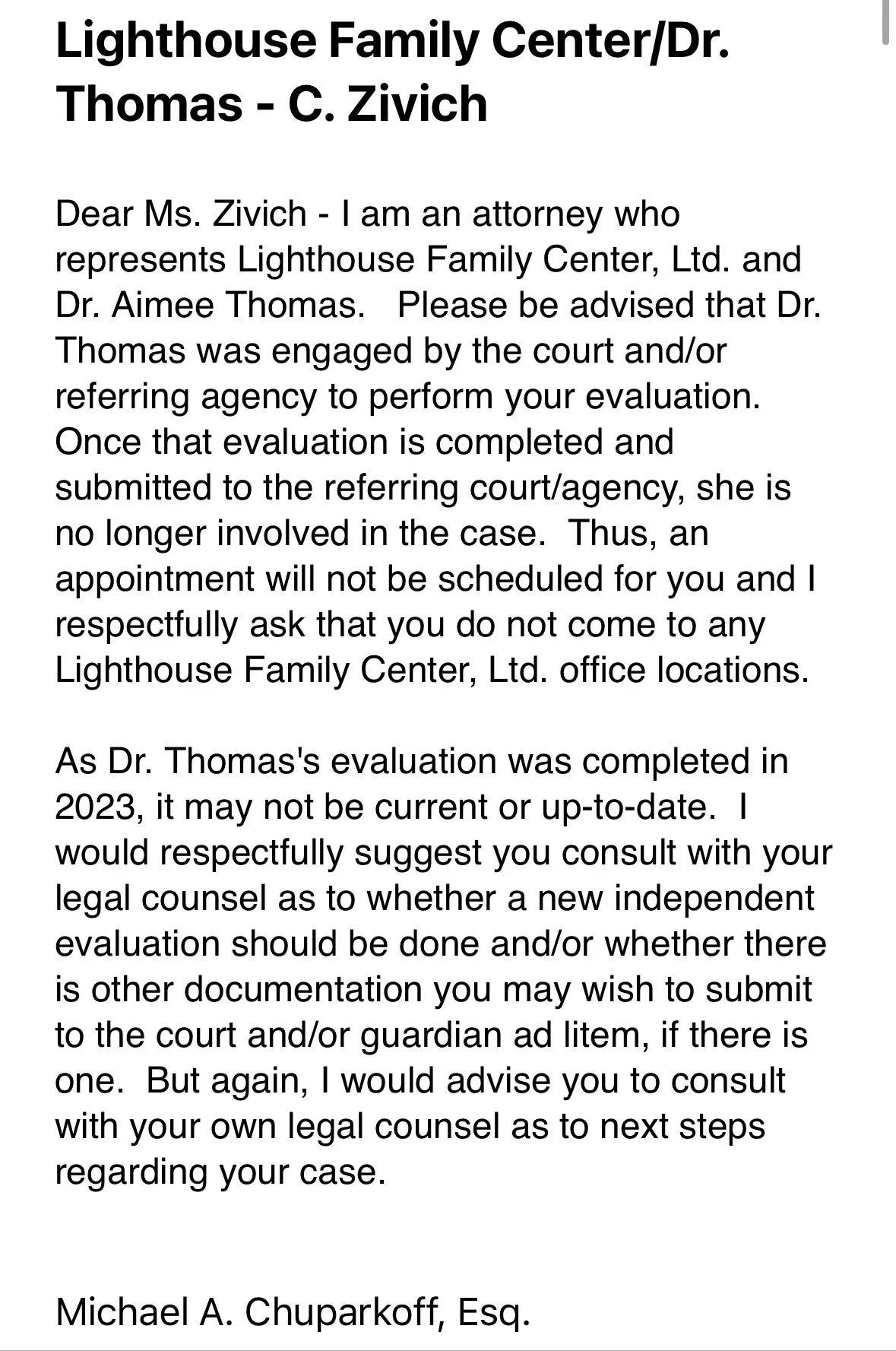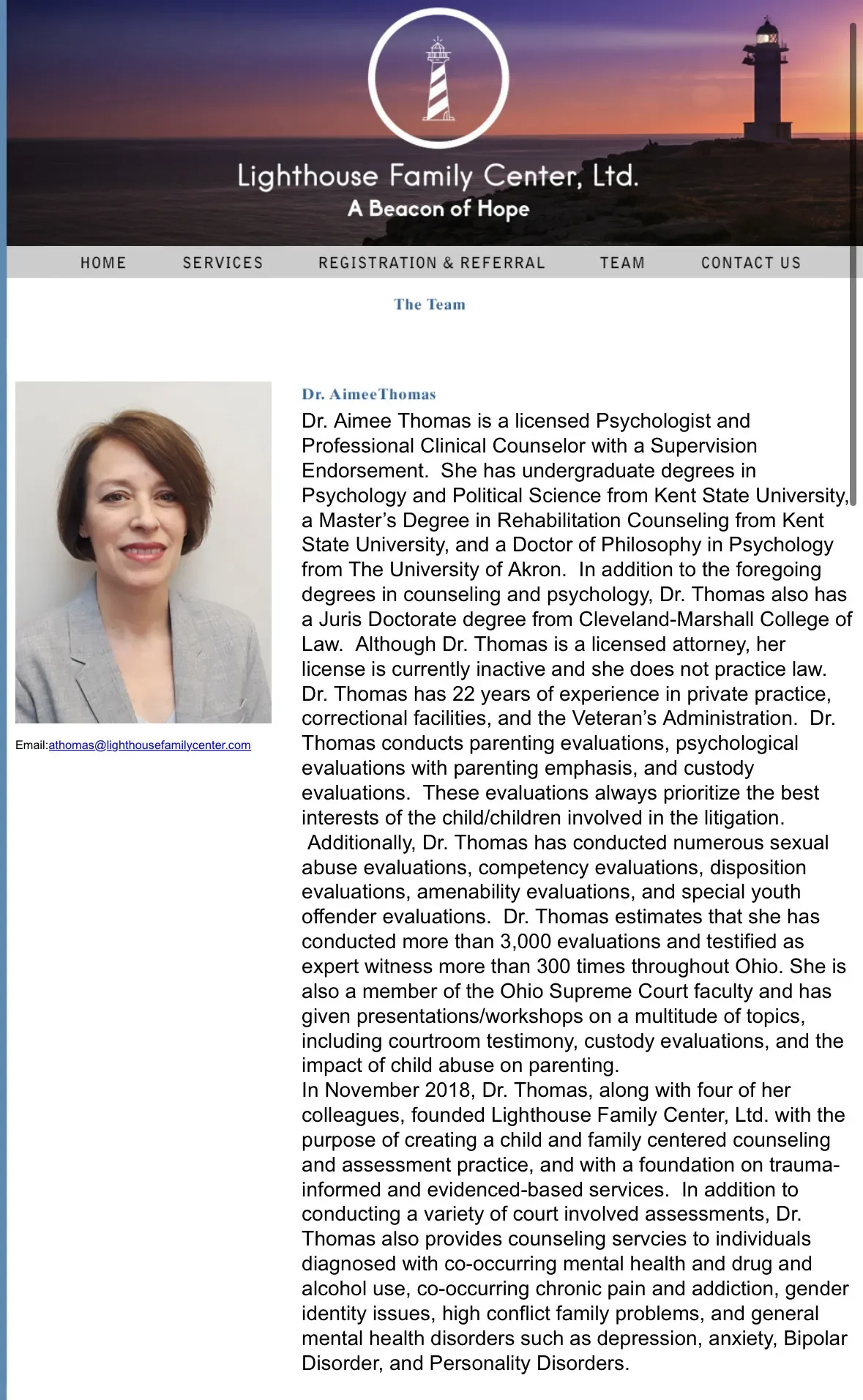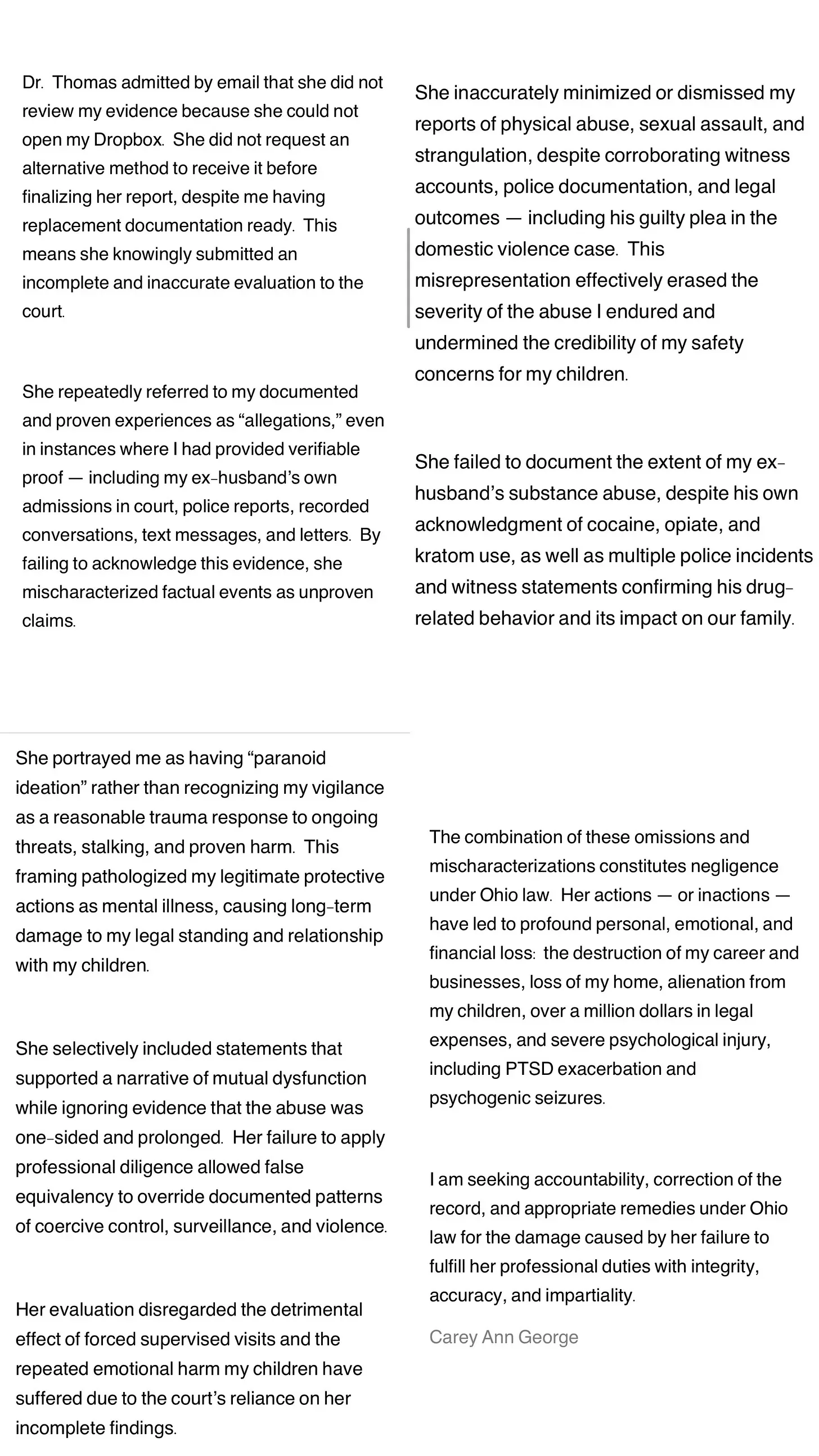Negligence Destroys Lives.
My Horrific Experience with Aimee Thomas of Lighthouse Family Center, LTD Summit County Ohio Court Appointed Psychologist - A Negligent And Incompetent Practice Robbing Others Of Justice and Hope While Destroying Lives
When Accountability Meets Retaliation: A Case Study in Systemic Failure
In any professional field—especially those influencing court outcomes—the expectation is clear: accuracy, diligence, and impartiality are non-negotiable. When mistakes occur, the ethical course is to correct them promptly and transparently. But what happens when, instead of addressing documented errors and omissions, the professional in question hires legal counsel to shut down further contact?
This is not an isolated problem. Across the country, individuals involved in court-appointed evaluations report a disturbing pattern: when a report is challenged for factual inaccuracy, bias, or incomplete evidence review, rather than engaging in correction or clarification, some evaluators respond defensively, even adversarially. This not only fails to correct the harm—it deepens it.
In my own experience, I provided extensive documentation to counter misstatements in a court-ordered evaluation. That documentation included police reports, witness statements, court transcripts, and other verifiable records. The evaluator acknowledged in writing that she had not reviewed key evidence due to a technical issue—but did not request an alternative submission method before finalizing her report. The result: a report that mischaracterized proven facts as “allegations,” downplayed documented abuse, omitted substance abuse evidence, and reframed my protective actions as delusion.
The consequences of such negligence go far beyond professional embarrassment. They can alter custody outcomes, endanger children, and inflict lasting emotional and financial harm. In my case, the flawed report contributed to years of supervised visitation, alienation from my children, over a million dollars in legal costs, and serious health impacts from prolonged trauma.
Rather than correcting these omissions when presented with evidence, the evaluator—through her attorney—formally refused further contact, citing the conclusion of her role. This maneuver may shield her from direct communication, but it does nothing to remedy the harm caused by the original negligence.
This is where the deeper problem lies: when professionals working in court-appointed roles are not held accountable for errors, the integrity of the entire system suffers. Without mechanisms to ensure corrections, families can be permanently harmed by incomplete or inaccurate evaluations.
The issue is bigger than one case. It raises urgent public questions:
Should there be mandatory error-correction protocols for court-appointed professionals?
Should evaluators be required to review all submitted evidence before filing reports?
How do we ensure professionals cannot hide behind procedural closure to avoid correcting harm?
Injustice flourishes when truth has no enforcement mechanism. Without accountability, we aren’t just tolerating mistakes—we’re enabling them. And in family court, those mistakes can cost people their children, their livelihoods, and their futures.
It’s time for reforms that ensure evaluators answer for their work, just as the rest of us do. The stakes are simply too high for anything less.
When an Evaluation Ignores the Evidence: A Pattern of Professional Negligence
Court-appointed psychological evaluations can change the course of a family’s future. That’s why the law and ethical codes require evaluators to exercise diligence, review all evidence, and avoid mischaracterizing facts. In my case, the opposite occurred.
Documented Failure to Review Evidence
Throughout the evaluation process, I sent Dr. Aimee Thomas extensive documentation: police reports, school records, photographs of injuries, witness statements, and deposition transcripts. She admitted in writing that she could not open my Dropbox links. She never requested an alternate method to receive the evidence before finalizing her report.
As a result, she submitted an evaluation to the court that excluded critical materials—despite knowing those materials existed and were available to her.
Misrepresentation of Proven Facts
In her report, Dr. Thomas repeatedly referred to documented and verifiable incidents as “allegations,” even when supported by:
• My ex-husband’s own admissions in court.
• Police documentation and incident reports.
• Recorded conversations and text messages.
By failing to acknowledge this evidence, she reframed factual events as unproven claims, altering the accuracy and balance of her evaluation.
Omission of Key Risk Factors
Dr. Thomas minimized or entirely omitted:
• Evidence of physical abuse, sexual assault, and strangulation—despite corroborating witness accounts and a guilty plea in a domestic violence case.
• Documented substance abuse, including my ex-husband’s admissions to cocaine, opiate, and kratom use, multiple rehab stays, and related police incidents.
Bias in Interpretation
Rather than recognizing my safety concerns and vigilance as reasonable trauma responses to ongoing threats, stalking, and documented harm, she labeled them “paranoid ideation.” This framing pathologized legitimate protective behavior and damaged my legal standing.
Selective Use of Statements
She included statements supporting a “mutual dysfunction” narrative while disregarding evidence showing the abuse was one-sided and ongoing. This allowed false equivalency to replace an accurate assessment of coercive control, surveillance, and violence.
Failure to Address Harmful Outcomes
Her evaluation disregarded the damaging effects of forced supervised visits and the emotional harm my children experienced as a result of the court’s reliance on her incomplete report.
Professional Duty and Public Trust
Psychological evaluations influence custody, safety, and the futures of children. The public must be able to trust that evaluators will review all evidence, correct errors when presented with them, and uphold their duty to the court without bias. When those standards are not met, families pay the price.
The documented record in my case shows that Dr. Aimee Thomas failed to meet these standards—through omissions, misrepresentations, and an unwillingness to correct known errors before filing her report.
Until there is meaningful accountability for such professional negligence, families will continue to suffer preventable harm under the weight of flawed evaluations.
Evidence Ignored vs. Ethical Requirement
(Based on documented communications and professional guidelines for court-appointed evaluators)
1. Failure to Review Evidence
• Evidence Ignored: Admitted in writing she could not open my Dropbox evidence and did not request an alternative method before finalizing her report.
• Ethical Requirement: Evaluators must review all relevant materials provided and take reasonable steps to obtain inaccessible evidence before completing an evaluation.
2. Misrepresentation of Proven Facts
• Evidence Ignored: Referred to documented incidents (with police reports, court admissions, recordings) as “allegations.”
• Ethical Requirement: All factual, verifiable events must be accurately represented and distinguished from unverified claims.
3. Omission of Documented Abuse
• Evidence Ignored: Excluded physical abuse, sexual assault, and strangulation despite corroborating witnesses and a guilty plea in a domestic violence case.
• Ethical Requirement: Evaluators must include all relevant safety concerns and risk factors impacting the welfare of children.
4. Disregard for Substance Abuse Evidence
• Evidence Ignored: Did not include my ex-husband’s admissions of cocaine, opiate, and kratom use, multiple rehabs, and police incidents.
• Ethical Requirement: Substance abuse history must be assessed and documented when evaluating parenting capacity and child safety.
5. Pathologizing Protective Actions
• Evidence Ignored: Labeled my vigilance in response to ongoing threats and stalking as “paranoid ideation.”
• Ethical Requirement: Trauma responses must be understood in context and not misdiagnosed in ways that undermine protective behavior.
6. Selective Use of Statements
• Evidence Ignored: Highlighted statements suggesting “mutual dysfunction” while omitting evidence showing abuse was one-sided and prolonged.
• Ethical Requirement: All relevant information must be weighed equally, avoiding bias through selective inclusion.
7. Harmful Impact Ignored
• Evidence Ignored: Failed to address the emotional harm my children suffered from unnecessary supervised visitation.
• Ethical Requirement: Evaluations must consider the psychological impact of recommendations on children and family relationships.
Disclaimer:
The information presented here is based on my personal experience, documented communications, and evidence submitted in legal proceedings. It reflects my understanding and perspective of events as they occurred. This post is intended for public awareness and discussion on matters of professional accountability in court-appointed evaluations. All readers are encouraged to review the full record and form their own conclusions.


